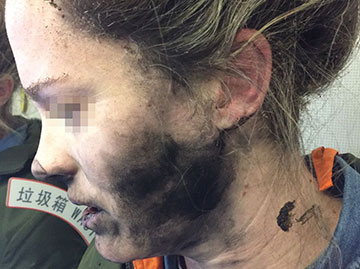Headphones explode while passenger sleeps
14 March, 2017
3 min read
By joining our newsletter, you agree to our Privacy Policy


A headphone meltdown involving a sleeping passenger has prompted a renewed warning from aviation safety authorities about the dangers of lithium batteries.
The incident involved a passenger listening to music using a pair of her own battery-operated headphones while on a recent flight from Beijing to Melbourne and who fell asleep with them on.
The Australian Transport Safety Bureau reported that the passenger heard a loud explosion about two hours into the flight.
“As I went to turn around I felt burning on my face,” the passenger told the ATSB. “I just grabbed my face which caused the headphones to go around my neck.
“I continued to feel burning so I grabbed them off and threw them on the floor. They were sparking and had small amounts of fire.
“As I went to stamp my foot on them the flight attendants were already there with a bucket of water to pour on them. They put them into the bucket at the rear of the plane.”
The battery and cover were melted and stuck to the floor of the aircraft and passengers spent the rest of the flight coughing as they endured the smell of melted plastic as well as burnt electronics and hair.
The incident is the latest of a series involving lithium batteries on aircraft, most notably the recent problems with Samsung Note 7.
Problems have also occurred where mobile phones have fallen between gaps in powered seats and passengers have crushed the battery moving the seat while trying to recover the device.
The ATSB said lithium batteries should be kept in approved stowage unless in use and spare batteries must be in carry-on baggage and not checked luggage.
This means keeping the batteries in the original retail packaging, taping over exposed terminals or keeping them in a separate plastic bag or protective pouch.
Passengers who lose their smartphone in a powered seat and are unable to find it should immediately call a cabin crew member and make sure they do not move the seat.
There are also power limitations on lithium batteries that can be taken on planes and limits on the number of spare batteries that can be carried.
The Civil Aviation Safety Authority also warns about the dangers of buying online cheap batteries which may be counterfeit.
“Unfortunately, electronic counterfeit goods do not meet stringent safety standards and pose serious dangers to the end user,’’ it says on a page dedicated to travelling safely with batteries.
“The best way to make sure the battery you’re buying is genuine is to buy it from a reputable, well-known buyer.”
Next Article
Virgin gets nod for Tiger deal

Get the latest news and updates straight to your inbox
No spam, no hassle, no fuss, just airline news direct to you.
By joining our newsletter, you agree to our Privacy Policy
Find us on social media
Comments
No comments yet, be the first to write one.
